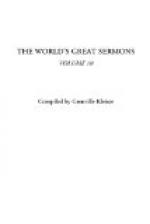If we turn to literature we encounter many such liberal thinkers as Theodore Parker, who calmly informs us: “This collection of books has taken such a hold upon the world as has no other. The literature of Greece, which goes up like incense from that land of temples and heroic deeds, has not half the influence of this book. It goes equally to the cottage of the plain man and the palace of the king. It is woven into the literature of the scholar and colors the talk of the street.” That is the voice of the liberalism which includes rather than excludes.
These were men not of the band of evangelical Christian preachers, who are roughly classed as a set of persons unable to tell the truth about the Bible, for fear they may lose their means of subsistence; these are men who know the true mission of the Bible. It is not to furnish a picture of life in the time of Moses such as life ought to be, a portrait of a David for the imitation of men, a statue of a warrior in a time of barbarism who shall command my obedience to his commands now, an idea of God wrought out in ignorance and darkness, which has no self-development within it. The mission of the Bible is to furnish a humanly written account of a people, just as human as we, in whom, by divine inspiration, the soul of truth so lived and worked as to develop, in gradual course, by laws, by hopes, by loves, by life, a living, and, at last, perfectly authoritative ideal of righteousness, but more than all a gradual growth of such moral power as would be commanding in the redeeming self-sacrifice and love of Jesus Christ. Every page of the Old Testament was only preparatory, as the thorny bush is preparatory for the rose. Christ is the end of the long, weary human history that leads to Him. If the laws of Sinai had been enough, there never would have been a Calvary. No one for a moment dreams that the God of nature could have brought forth such a fruit as the life and ideas of Jesus without a tree of such a history, a tree rooted in the ground, storm-twisted, gnarled, and valuable only for its fruit. We are not asked to eat the roots and bark and branches; only the fruit has an appeal to us. Its appeal is to our hunger, its authority lies in the fact that it satisfies our hunger.




